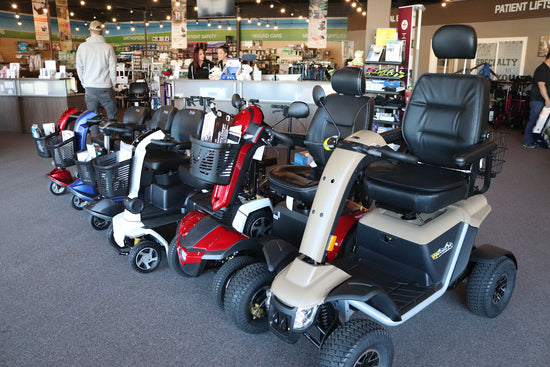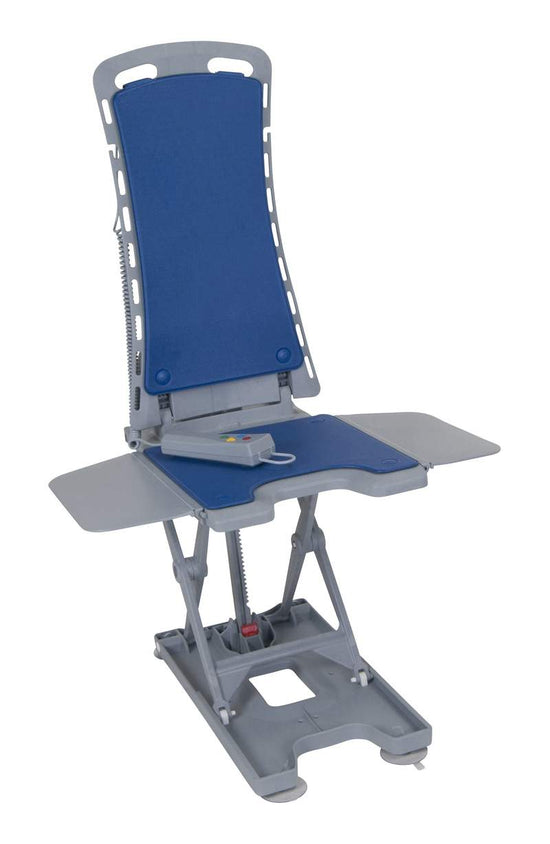"Independence and mobility are not just about moving from one place to another; they're the very essence of living a fulfilling life." This statement captures the profound impact that power wheelchairs have on individuals facing mobility challenges.
In the realm of healthcare and personal mobility, technological advancements have been a beacon of hope and liberation for many. As we delve into the transformative world of power wheelchairs, it's essential to recognize how these devices are not merely tools for movement but are indeed gateways to a renewed sense of freedom and autonomy.
They offer individuals the chance to reclaim parts of their lives that were once thought lost to limitations, thus opening up a spectrum of possibilities that enhance both physical well-being and mental health.
Understanding Power Wheelchairs: Features and Types
In the realm of mobility aids, power wheelchairs stand out as pivotal instruments of independence, offering a blend of technology and personalization to meet diverse needs. Understanding the features and types of power wheelchairs is crucial for anyone considering this life-enhancing option. Let's explore some key types, including Folding Power Wheelchairs, Lightweight Power Wheelchairs, and standard Power Wheelchairs, to help navigate the vast landscape of choices available.
Folding Power Wheelchairs are designed for the ultimate in portability and convenience. As suggested by their name, these wheelchairs can be easily folded into a compact size, making them ideal for travel or storage in tight spaces. Despite their foldable nature, they do not compromise on strength or durability, providing a reliable mobility solution for users on the go. This feature is particularly beneficial for individuals who frequently travel or have limited storage space at home.
Lightweight Power Wheelchairs represent another category focused on ease of use and transportability. These models are crafted from lighter materials without sacrificing performance or battery life. The reduced weight makes these chairs easier to maneuver and less cumbersome to transport, offering a good balance between functionality and convenience. Lightweight power wheelchairs are perfect for users seeking a less bulky option that still delivers robust support and mobility.
Standard Power Wheelchairs are the most common type, offering a range of features tailored to meet various needs. These wheelchairs are equipped with powerful motors and batteries designed for long-lasting use and can accommodate a wide variety of seating options, control mechanisms, and customization to suit individual preferences and requirements. From front-wheel to mid-wheel and rear-wheel drive configurations, each design offers different handling characteristics. For instance, mid-wheel drive chairs provide excellent maneuverability in tight spaces, while front- and rear-wheel drives offer stability over uneven terrains.
When considering a power wheelchair, it's essential to assess your lifestyle, mobility needs, and personal preferences. Factors such as where you'll predominantly use the wheelchair, how often you'll need to transport it, and specific features like seat adjustability, control options, and battery life should influence your decision.
Choosing the right power wheelchair can profoundly impact one's quality of life, offering a blend of independence, mobility, and comfort. With advancements in technology and design, today's power wheelchairs cater to a broad spectrum of needs and preferences, ensuring that users can find the perfect match to lead a more active and fulfilling life.
The Impact of Power Wheelchairs on Independence and Quality of Life

The transformative impact of power wheelchairs on the lives of individuals with mobility challenges cannot be overstated. By enhancing personal independence and overall quality of life, these advanced mobility aids open up a world of possibilities for users, allowing them to engage more fully in daily activities and community life. Let's delve into how power wheelchairs can significantly improve an individual's experience:
- Enhanced Mobility and Independence: Power wheelchairs provide users with the ability to move around freely and independently, reducing reliance on caregivers for basic mobility needs. This autonomy allows for greater control over one's life and daily decisions.
- Increased Participation in Social Activities: With the mobility that power wheelchairs offer, users can more easily participate in social, educational, and recreational activities. This engagement is crucial for mental health, helping to prevent feelings of isolation and depression.
- Improved Access to Employment and Education: Power wheelchairs enable users to pursue their careers and educational goals by facilitating access to workspaces and academic institutions, thus fostering financial independence and personal growth.
- Better Overall Health: The independence afforded by power wheelchairs can lead to more active lifestyles, contributing to improved physical health. Additionally, the ability to engage in various activities can have a positive impact on mental health.
- Customization and Comfort: Modern power wheelchairs are highly customizable, allowing for adjustments that cater to the specific medical and comfort needs of the user, further enhancing their quality of life.
Power wheelchairs do more than just provide mobility; they are a key to unlocking a fuller, more connected life. They represent not just a means of getting from point A to point B, but a profound leap towards autonomy, participation, and well-being.
Navigating the Selection Process: How to Choose the Right Power Wheelchair
Choosing the right power wheelchair is a critical decision that can significantly impact one’s independence and quality of life. With so many options available, the selection process may seem daunting. However, by considering a few key factors, you can make an informed choice that best suits your needs. Here's a guide to navigating the selection process, ensuring you find the perfect power wheelchair for your lifestyle.
- Assess Your Mobility Needs: Begin by evaluating your daily activities and environments. Consider whether you'll be using the wheelchair indoors, outdoors, or both. Think about the type of terrain you'll encounter and any specific requirements such as maneuverability in tight spaces.
- Consult with Healthcare Professionals: It's essential to involve your healthcare team, including doctors and occupational therapists, in the decision-making process. They can provide valuable insights into your medical needs and recommend features that would be most beneficial for your condition.
- Consider the Wheelchair's Features: Look for features that align with your lifestyle and mobility needs. This includes battery life for longer distances, seat adjustability for comfort, and the wheelchair's weight capacity to ensure it supports you securely.
- Test Drive Different Models: If possible, test various power wheelchairs to get a feel for how they handle and to assess their comfort levels. Pay attention to how easy it is to operate the controls and how well the wheelchair maneuvers.
- Think About Portability and Storage: If you travel frequently or have limited storage space, consider a model that's easily transportable, such as a folding power wheelchair or a lightweight model.
- Plan for the Future: Choose a wheelchair that not only meets your current needs but also has the flexibility to adapt to changing conditions. Adjustable features and the ability to add accessories can be invaluable.
- Seek Trusted Suppliers: When you're ready to make a purchase, look for reputable suppliers with experience in home medical equipment. For trusted Home Medical Equipment and Supplies, consider reaching out to Everything Medical. Their expertise can guide you through the selection process, ensuring you find a power wheelchair that truly enhances your mobility and quality of life.
Selecting the right power wheelchair is a journey towards greater independence and participation in life. By carefully considering your needs and seeking advice from professionals, including trusted suppliers like Everything Medical, you're on your way to finding a power wheelchair that offers a new lease on life.
Maintenance and Care: Ensuring the Longevity of Your Power Wheelchair
Maintaining and caring for your power wheelchair is crucial to ensure its longevity and reliability. A well-maintained wheelchair not only provides a safer ride but also minimizes the risk of unexpected breakdowns. Here are some essential tips for keeping your power wheelchair in top condition:
Regular Cleaning:
- Wipe down the seat, backrest, and frame regularly with a damp cloth to remove dirt and grime.
- Use mild soap and water for thorough cleaning, avoiding harsh chemicals that can damage the wheelchair's components.
Battery Care:
- Charge the battery according to the manufacturer's instructions, typically after daily use.
- Keep the battery terminals clean and check for corrosion regularly. If you notice any corrosion, clean it off or consult a professional for maintenance.
Tire Maintenance:
- Check the tire pressure regularly and inflate them as needed to the recommended level.
- Inspect tires for wear and tear, and replace them if they show signs of significant wear.
Check Moving Parts:
- Lubricate bearings, axles, and other moving parts periodically to ensure smooth operation.
- Tighten any loose screws or bolts to prevent parts from coming off during use.
Professional Inspections:
- Schedule regular check-ups with a professional technician to assess the wheelchair's electrical system, motor, and other components.
- Address any issues or repairs promptly to avoid further damage.
By adhering to these maintenance and care guidelines, you can significantly extend the life of your power wheelchair, ensuring it continues to provide independence and mobility. Remember, a little care goes a long way in maintaining the performance and reliability of your power wheelchair, giving you peace of mind and a smoother ride.




